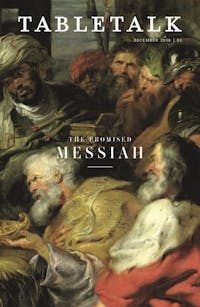
Request your free, three-month trial to Tabletalk magazine. You’ll receive the print issue monthly and gain immediate digital access to decades of archives. This trial is risk-free. No credit card required.
Try Tabletalk NowAlready receive Tabletalk magazine every month?
Verify your email address to gain unlimited access.
At Saint Andrew’s Chapel, we recently concluded a two-and-a-half-year study of the book of Exodus in our Sunday evening worship services. It was a tremendous journey as we made our way from Egypt, through the Red Sea, through the wilderness, up and down Mount Sinai, and toward the promised land. From the outset, we observed that one of the fundamental reasons for God’s deliverance of Israel from Egypt was not simply that the Israelites would be free from bondage but that they would be set free in order to worship the Lord. Simply put, Exodus is not fundamentally about the exodus but about worship. The Lord delivered Israel that they might worship Him. The narrative of Exodus corresponds to the overarching theological narrative of Scripture, and the grand overarching narrative of Scripture is not simply redemption from bondage but redemption for worship.
Throughout the New Testament, the Lord gloriously unfolds how the promised Messiah fulfilled the prophecies, promises, and plan of our triune God. Matthew’s gospel reveals how Jesus is the true and greater Israel of God (Matt. 2:13–15; 5:17; see Hos. 11:1) who accomplished what Israel failed to accomplish. He went down into Egypt and came up out of Egypt (Matt. 2). He passed through the waters (3:13–17) and through the wilderness, where He was tempted to worship something other than God alone and was sustained by every word that proceeds from the mouth of God (4:1–11). He spoke with Moses and Elijah about His departure (literally, His “exodus”; see Luke 9:31). And as He repeated the story of Israel in His own person, He fulfilled the offices of king and prophet, serving as the King in the line of David who is also David’s greater Son (2:2; 12; 21:5; 27:27–31; see 2 Sam. 7) and as the Prophet greater than Moses (11:1–19; 23–24; see Deut. 18:15–22).
Jesus repeated, advanced, and fulfilled the history of Israel in the climax of His work. He suffered the exile of His death on the cross (Matt. 27:32–50), where He also fulfilled His role as the greater High Priest and the sacrificed Passover Lamb (26:1–13; 27:51). There, the temple of His body was destroyed (26:61; 27:40), but on the third day He was restored from the exile of death in His resurrection, raising up the temple of His body (28:1–10) and becoming the cornerstone of the new temple, His church, which is the fulfillment of God’s plan for His true people Israel (1 Peter 2:4–8). God’s sovereign plan and promise could not be thwarted, for now Jesus Christ has all authority in heaven and earth, and is with us to the end of the age, and He will return as our King and take us to the heavenly Promised Land.
